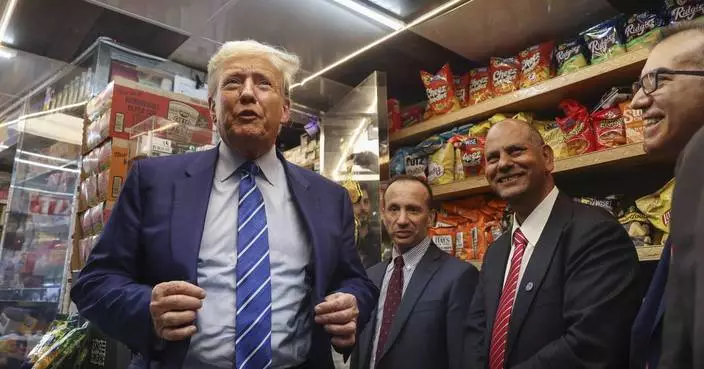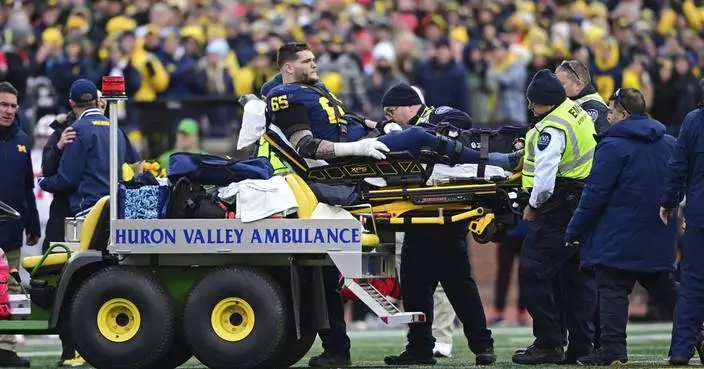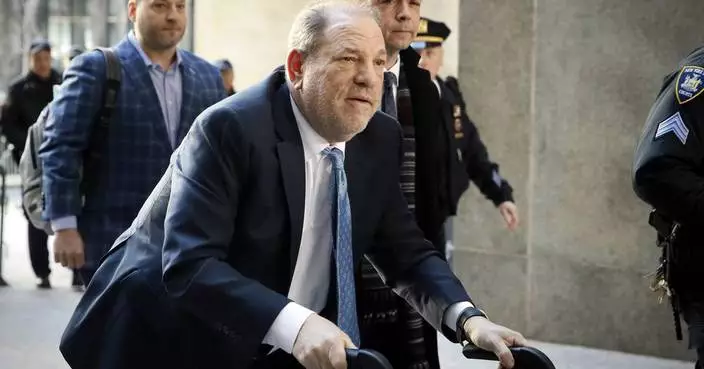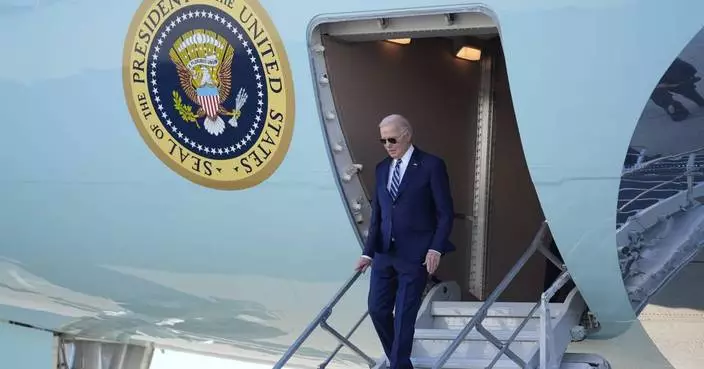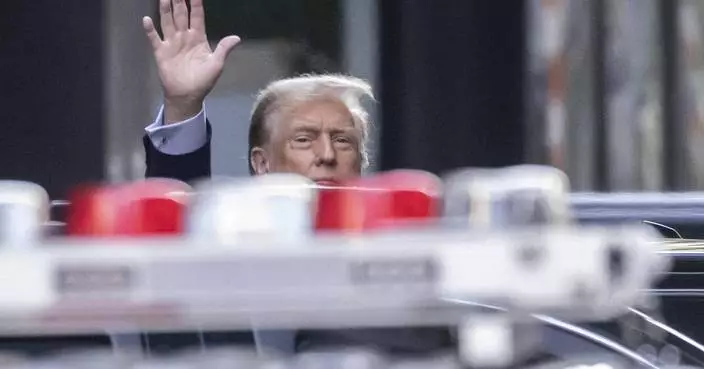President Donald Trump disputed findings by the Justice Department on Friday that former FBI Director James Comey's handling of the Hillary Clinton email probe was not politically motivated, declaring that there was "total bias" at the FBI and that the "top people" at the agency were "plotting against my election."
The department's inspector general report, while critical of the FBI and Comey personally, did not find evidence that political bias tainted the investigation of Clinton's email practices in the months and days leading up to Trump's election.
Click to Gallery
President Donald Trump disputed findings by the Justice Department on Friday that former FBI Director James Comey's handling of the Hillary Clinton email probe was not politically motivated, declaring that there was "total bias" at the FBI and that the "top people" at the agency were "plotting against my election."
But on Friday, after tweeting that he did a "great service" to the nation by firing Comey, Trump marched out to the White House North Lawn to talk with "Fox & Friends" for more than half an hour, claiming the report "totally" exonerated him, then pointing to accomplishments he said he's achieved and complaining about not getting proper credit.
Trump's supporters have argued that the findings are proof of political bias at the FBI's highest levels that then tainted the Russia investigation, first led by the FBI and now by special counsel Robert Mueller. Mueller's probe includes a look into whether Trump himself tried to obstruct justice by firing Comey.
"We found that it was extraordinary and insubordinate for Comey to do so, and we found none of his reasons to be a persuasive basis for deviating from well-established Department policies in a way intentionally designed to avoid supervision by department leadership over his actions," the report says.
The FBI obtained a warrant nine days before the presidential election to review those emails, found on the laptop of former Rep. Anthony Weiner, D-N.Y., — the husband of top Hillary Clinton aide Huma Abedin — and ultimately determined there was nothing that changed its original conclusion.

President Donald Trump speaks to reporters at the White House, Friday, June 15, 2018, in Washington. (AP Photo/Evan Vucci)
But on Friday, after tweeting that he did a "great service" to the nation by firing Comey, Trump marched out to the White House North Lawn to talk with "Fox & Friends" for more than half an hour, claiming the report "totally" exonerated him, then pointing to accomplishments he said he's achieved and complaining about not getting proper credit.
Then he turned to other reporters and went over the same list for another 20 minutes.
On the inspector general report that found no political bias in the FBI's final conclusions, he said, "The end result was wrong. There was total bias."
"Comey was the ring leader of this whole, you know, den of thieves. It was a den of thieves," he said.
Trump's comments followed the IG's 500-page report that said Comey was "insubordinate" in his handling of the Clinton investigation because he broke agency protocol. The report also rebuked FBI officials for exchanging anti-Trump text messages during the 2016 campaign.
But it said, "We found no evidence that the conclusions by the prosecutors were affected by bias or other improper considerations; rather, we determined that they were based on the prosecutors' assessment of the facts, the law and past department practice."

From left, Rep. Adam Schiff, D-Calif., ranking member of the House Intelligence Committee, Senate Minority Leader Chuck Schumer, D-N.Y., House Minority Leader Nancy Pelosi, D-Calif., Rep. Jerrold Nadler, D-N.Y., the ranking member of the House Judiciary Committee, and Sen. Dianne Feinstein, D-Calif., the ranking member of the Senate Judiciary Committee, respond to the Justice Department's internal 18-month review of the FBI's handling of the Hillary Clinton email investigation, on Capitol Hill in Washington, Thursday, June 14, 2018. While the report faulted former FBI Director James Comey for being "insubordinate" and breaking protocols in his handling of the Hillary Clinton email investigation during the 2016 presidential election, it also concluded there was no evidence that Comey was motivated by political bias. (AP Photo/J. Scott Applewhite)
Trump's supporters have argued that the findings are proof of political bias at the FBI's highest levels that then tainted the Russia investigation, first led by the FBI and now by special counsel Robert Mueller. Mueller's probe includes a look into whether Trump himself tried to obstruct justice by firing Comey.
Trump said Friday, as he has before, that the Mueller probe, too, "has been totally discredited."
"The IG Report is a total disaster for Comey, his minions and sadly, the FBI," Trump tweeted earlier. "Comey will now officially go down as the worst leader, by far, in the history of the FBI. I did a great service to the people in firing him. Good Instincts."
Trump's personal lawyer, Rudy Giuliani, told "Fox & Friends" that the report casts doubt on whether Trump will ever agree to an interview with Mueller's team because "why would he get interviewed by a corrupt investigation?"
Trump himself said he had "reservations."
Thursday's report documents in painstaking detail one of the most consequential investigations in modern FBI history and reveals how the bureau, which for decades has endeavored to stand apart from politics, came to be entangled in the 2016 presidential election. It underscores efforts by FBI and Justice Department leaders to juggle developments in the Clinton investigation — she had used private email for government business while secretary of state — with a separate probe that was then unknown to the American public into potential coordination between the Trump campaign and Russia.
Clinton supporters believe Comey's actions, far from hurting Trump, may well have torpedoed her chance of becoming president.
The IG found the FBI director erred when he announced in July 2016 that Clinton had been "extremely careless" with classified material but would not be charged with any crime, and again months later when Comey told Congress just days before the election that the investigation into Clinton's emails had been reopened. Comey concealed from the Justice Department his plans to make a public announcement until the morning he did so, even though such statements are normally handled by the Justice Department, if at all, the report says.
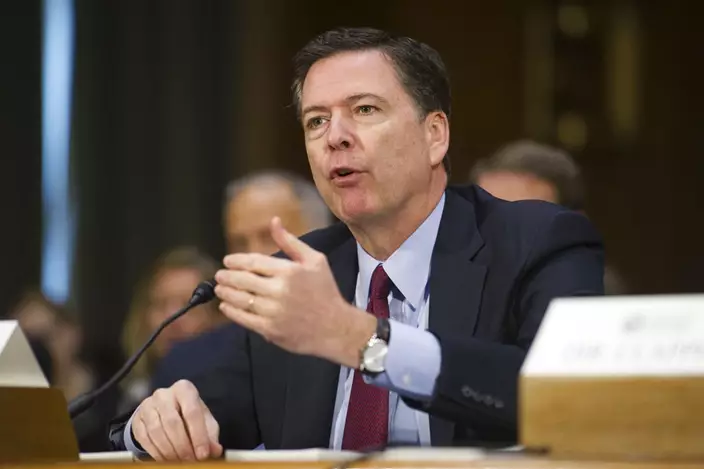
FILE - In this Jan. 10, 2017 file photo, then-FBI Director James Comey testifies on Capitol Hill in Washington. (AP Photo/Cliff Owen, File)
"We found that it was extraordinary and insubordinate for Comey to do so, and we found none of his reasons to be a persuasive basis for deviating from well-established Department policies in a way intentionally designed to avoid supervision by department leadership over his actions," the report says.
Trump supporters, and then the president himself, quickly focused on the report's recounting of anti-Trump text messages from two FBI officials who worked the Clinton probe and later the Russia case, including one in which an agent says, "We'll stop it," with regard to a possible Trump victory.
The report suggests that text from Peter Strzok, who was later dropped from Mueller's team, "implies a willingness to take official action to impact the presidential candidate's electoral prospects." It did not find evidence that those views seeped into the investigation.
FBI Director Chris Wray told reporters the FBI accepted the report's findings and was making changes, including requiring further training for FBI employees and re-emphasizing the importance of objectivity. In a New York Times opinion piece released after the report, Comey said he disagreed with some conclusions but respected the watchdog's work.
Also criticized in the report was Comey's decision, despite the discouragement of the Justice Department, to reveal to Congress that the FBI was reopening the investigation following the discovery of new emails.

Part of the the Department of Justice Inspector General's report after its release in Washington, Thursday, June 14, 2018. The report documented in painstaking detail one of the most consequential investigations in modern FBI history and revealed how the bureau, which for decades has endeavored to stand apart from politics, came to be entangled in the 2016 presidential election.(AP Photo/Jon Elswick)
The FBI obtained a warrant nine days before the presidential election to review those emails, found on the laptop of former Rep. Anthony Weiner, D-N.Y., — the husband of top Hillary Clinton aide Huma Abedin — and ultimately determined there was nothing that changed its original conclusion.
The report faulted the FBI for failing to act with more urgency in reviewing emails from Weiner's laptop, saying the inaction had "potentially far-reaching consequences." Clinton supporters say her name could have been cleared well before the election had the FBI moved faster to review the emails. Comey said had he known earlier about the laptop's import it might have affected his decision to notify Congress.
The report also notes that Comey, despite chiding Clinton for mishandling government business, occasionally used personal email himself to discuss FBI matters.
"But my emails," she said, reacting in a three-word tweet.

FBI Director Christopher Wray speaks during a news conference on the inspector general's report at FBI headquarters on Thursday, June 14, 2018, in Washington. (AP Photo/Jose Luis Magana)
NEW YORK (AP) — Donald Trump says he wants to hold a major campaign event at New York’s Madison Square Garden featuring Black hip-hop artists and athletes. His aides speak of making appearances in Chicago, Detroit and Atlanta with leaders of color and realigning American politics by flipping Democratic constituencies.
But five months before the first general election votes are cast, the former president’s campaign has little apparent organization to show for its ambitious plans.
The Trump campaign removed its point person for coalitions and hasn’t announced a replacement. The Republican Party’s minority outreach offices across the country have been shuttered and replaced by businesses that include a check-cashing store, an ice cream shop and a sex-toy store. And campaign officials concede they are weeks away from rolling out any targeted programs.
The presumptive Republican presidential nominee has struggled to navigate a messy transition into the general election plagued by staffing issues, his personal legal troubles and the “Make America Great Again” movement’s disdain for so-called “ identity politics.” There are signs of frustration on the ground, where Republicans believe Trump has a real opportunity to shift the election by cutting into President Joe Biden’s advantage with voters of color.
“To be quite honest, the Republican Party does not have a cohesive engagement plan for Black communities,” said Darrell Scott, a Black pastor who served as a senior advisor on Trump’s 2016 and 2020 campaigns. “What it has are conservatives in communities of color that have taken it upon themselves to head our own initiatives.”
In Michigan, a critical battleground that flipped from Trump to Biden four years ago, several party officials confirmed that the Republican National Committee, overhauled by Trump allies after he clinched the nomination in March, has yet to set up any community centers for minority outreach. Office spaces to house the centers have been offered up by community members, but staffing has been an issue, said Oakland County GOP Chair Vance Patrick.
“We’ve got all these carts but we have no horses yet,” said Patrick. “So, it’s all about making sure we have staffing when we open up these offices.”
On-the-ground political organizing has long been a hallmark of successful presidential campaigns, which typically invest tremendous resources into identifying would-be supporters and ensuring they vote. The task may be even more critical this fall given how few voters are excited about the Biden-Trump rematch.
The Trump campaign hired a national coalitions director in October 2023, almost a year after he launched his campaign. But the staffer, Derek Silver, departed in March without explanation, according to two people familiar with the matter who spoke on the condition of anonymity to share internal discussions. Silver did not return multiple requests for comment and no replacement has been announced.
Trump’s advisors reject criticism that they’re not doing enough organizing or spending to reach minorities. James Blair, the campaign’s political director, said the campaign would not “broadcast” its spending or staffing levels, “but I assure you, it’s enough to ensure President Trump’s historic surge in support amongst Black and Hispanic voters sticks in November and beyond.”
Lynne Patton, a senior adviser on the campaign overseeing coalitions work who has worked closely with the Trump family for decades, said that Trump’s political team is laying the groundwork for a robust minority outreach program, although largely in private.
“We are speaking with Black leaders, we are speaking with small business owners, we’re speaking with famous athletes, hip-hop artists, some of whom I think you’d be surprised if you knew who was talking with us right now,” Patton said in an interview. “These are people who are expressing openness to supporting President Trump both publicly and privately.”
Polls show that many Black and Hispanic adults are dissatisfied with Biden. According to AP-NORC polls, Biden’s approval among Black adults has dropped from 94% when he started his term to just 55% in March. Among Hispanic adults, it dropped from 70% to 32% in the same period.
And an April poll by the Pew Research Center confirms the problem is especially acute among younger adults: Just 43% of Black adults under 50 said they approve of Biden in that poll, compared with 70% of those age 50 and older. Among Hispanics, 29% of younger adults said they approve, slightly less than the 42% who said that among those 50 and older.
Trump's allies argue that increased frustration about crime, inflation and immigration may win over some voters of color who have previously been less receptive to Trump’s record and divisive rhetoric.
Biden has been spending millions of dollars on ads targeting Black and Latino voters in presidential battleground states. That’s in addition to dozens of new office openings in minority neighborhoods. All the while, Biden’s team has frequently dispatched Vice President Kamala Harris, the nation’s first Black female vice president, and other prominent leaders of color to key states.
“Donald Trump and MAGA Republicans proudly admitting that they have no real strategy to reach Black voters because they believe all they need is rap concerts and free chicken is only surprising if you haven’t paid attention to Trump’s fraudulent relationship to Black America for years,” said Jasmine Harris, the Biden campaign’s Black media director, who described Trump as “a fraud” who “takes every opportunity available to him to demean our community.”
Republican strategist Alice Stewart, a veteran of several GOP campaigns, said she’s confident that the Trump campaign will ultimately do what’s necessary.
“But the key is they can’t just talk about minority outreach,” she said. “They have to do it.”
Brown reported from Washington. AP Director of Public Opinion Research Emily Swanson in Washington and Associated Press writers Joey Cappelletti in Lansing, Michigan; Michael Rubinkam in Allentown, Pennsylvania; Todd Richmond in Madison, Wisconsin; Julie Carr Smyth in Columbus, Ohio; and Sean Murphy in Oklahoma City, Oklahoma, contributed.

FILE - Republican presidential candidate former President Donald Trump visits a Chick-fil-A eatery, April 10, 2024, in Atlanta. Five months before the first general election votes are cast, Trump's campaign has little to show for its ambitious minority outreach plan. Trump advisers point to Trump's appearances at the eatery, as well as a New York bodega and a New York City police officer's wake as examples of the campaign's developing outreach strategy that hinges on using Trump's celebrity and bombastic personality to create viral moments in communities of color. (AP Photo/Jason Allen, File)

Trump promised big plans to flip Black and Latino voters. Many Republicans are waiting to see them

Trump promised big plans to flip Black and Latino voters. Many Republicans are waiting to see them

FILE - Republican presidential candidate former President Donald Trump, left, visits a bodega, April 16, 2024, in New York. Five months before the first general election votes are cast, Trump's campaign has little to show for its ambitious minority outreach plan. Trump advisers point to Trump's appearances at the bodega, an Atlanta Chick-fil-A, and a New York City police officer's wake, as examples of the campaign's developing outreach strategy that hinges on using Trump's celebrity and bombastic personality to create viral moments in communities of color. (AP Photo/Yuki Iwamura, File)












